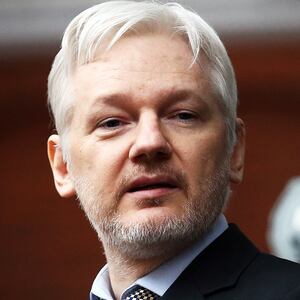It has been six long years since Australian secret-spiller Julian Assange jumped bail and sought refuge in the Ecuadorian embassy in London to escape an international arrest warrant for alleged sex abuse and rape in Sweden. During that time, he has gained Ecuadorian citizenship and the Swedish charges have been dropped, but if he leaves the embassy, he risks arrest for breaching bail and the possibility of extradition to the United States, where federal charges appear to have been filed against him in secret.
He is suspected of acting on behalf of Russia’s GRU intelligence agency to distribute emails and hacked documents belonging to the Democratic National Committee during the 2016 presidential election. In April 2017, CIA Director Mike Pompeo called Assange’s web-based agency WikiLeaks a “a non-state hostile intelligence service, often abetted by state actors like Russia.”
The Ecuadorian embassy staff have apparently grown tired of hosting their global persona non grata, and are essentially trying to squeeze him out by forcing him into what amounts to isolation. They’ve cut off his internet—his lifeline, and won’t let most visitors in to see him. Those who try to leave messages, like Trump presidential adviser Roger Stone, who left his card earlier this year, are apparently turned away. Not even former Baywatch star Pamela Anderson, his ardent supporter who was a frequent guest and suspected paramour, can get past the guards.
But last week, journalists from the Italian newspaper La Repubblica, who have visited Assange annually for the last six years, were able to once again gain access—on the condition that they do not print an interview that might provoke even more pressure on Ecuador to kick him out.
What they found was a depleted man on the verge of going mad.
“As soon as we saw him, we realized he has lost a lot of weight,” the La Repubblica reporters write. “He is so skinny. Not even his winter sweater can hide his skinny shoulders. His nice-looking face, captured by photographers all around the world, is very tense. His long hair and beard make him look like a hermit, though not a nutter: As we exchange greetings, he seems very lucid and rational.”
They say Assange’s cramped quarters at the embassy do not allow him access to the garden, which means he does not go outside—something even prisoners serving life sentences in isolation are afforded. He only speaks to his lawyer and the security guards, he has limited phone service, and his mail is strictly monitored.
The embassy has been bolstered with window grates to ward off anyone who might want to attack him, which gives the compound the feel of a high-security prison while decreasing natural light in all the windows. Even the cat that once kept him company and “diffused tension” is gone, according to La Repubblica.
“Assange preferred to spare the cat an isolation which has become unbearable and allow it a healthier life.”
The journalists say that Assange is spending all of his time preparing for his criminal defense against charges that are believed to have been filed in the United States. In mid-November, a filing in an unrelated sex-crime case inadvertently revealed that Assange had already been charged under seal in the U.S.
Subsequent efforts by the Reporters Committee for Freedom of the Press to unseal the case have so far been unsuccessful, though the Justice Department conceded to The Daily Beast two weeks ago that Assange’s name was in the document as a result of an error.
On Monday, the U.S. District Court for the Eastern District of Virginia filed its own brief to explain why the Reporters Committee request to unseal the Assange affair should not be granted.
“This matter arises out of an unintentional error by the government in a filing in the case United States v. Seitu Sulayman Kokayi, 1:18mj406, which led to speculation about whether charges have been filed against Julian Assange, and prompted the application that is currently before this court. The government accepts full responsibility for that mistake. Even though that error may have triggered speculation by the Reporters Committee, the plaintiff’s application lacks merit and should be denied in light of established law and precedent,” the government brief states.
“While the government has admitted that the aforementioned court filing was made in error, it has not confirmed or denied whether charges against Julian Assange exist, which is what the plaintiff seeks to learn through its application. Neither the First Amendment nor the common law require that the government provide such a confirmation or denial.”
Assange suggested to La Repubblica’s reporters that he assumes the U.S. government has indeed charged him, even though his lawyers, who were denied access to the Ecuadorian embassy last weekend, say they have yet to secure confirmation.







